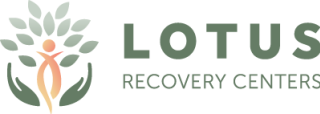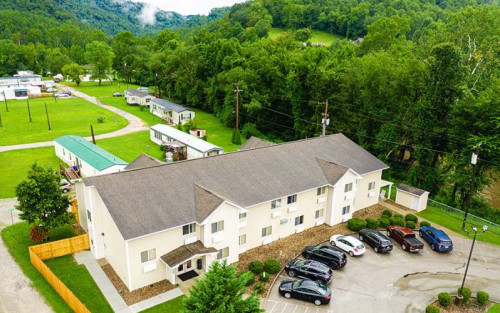
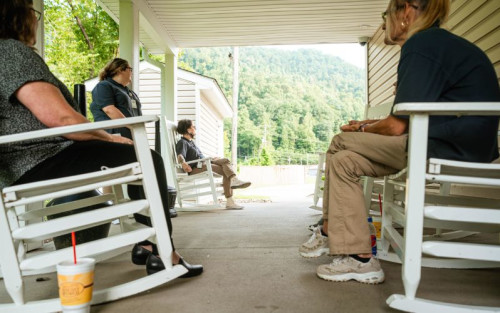
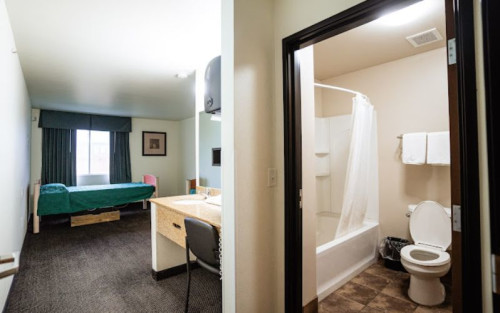



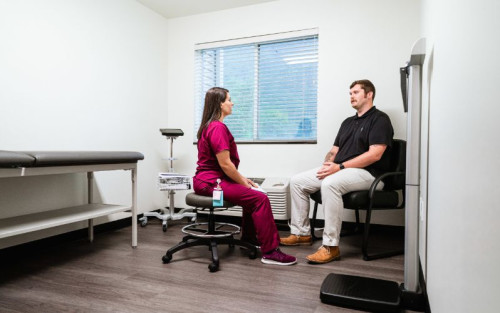
Lotus Recovery Center of Comfort
Verified Center
This provider's information has been quality-checked by Recovery.com's Research Team for accuracy and completeness, including center verification through appropriate third-party organizations.
Treatment Focus
This center treats substance use disorders and co-occurring mental health conditions. Your treatment plan addresses each condition at once with personalized, compassionate care for comprehensive healing.
Primary Level of Care
Offering intensive care with 24/7 monitoring, residential treatment is typically 30 days and can cover multiple levels of care. Length can range from 14 to 90 days typically.
Treatment Focus
This center treats substance use disorders and co-occurring mental health conditions. Your treatment plan addresses each condition at once with personalized, compassionate care for comprehensive healing.
Primary Level of Care
Offering intensive care with 24/7 monitoring, residential treatment is typically 30 days and can cover multiple levels of care. Length can range from 14 to 90 days typically.
Provider's Policy
Lotus Recovery Centers is proud to be in-network with a number of insurance carriers including Highmark Blue Cross of WV, all Medicaid plans in the state, VACCN and more. We also accept out of network insurance where we are not contracted. Our admissions department is happy to provide a confidential benefit verification so you can have a clear picture of what your costs will be.
Lotus Recovery Center of Comfort
Lotus Recovery Center of Comfort
About Lotus Recovery Center of Comfort
Lotus Recovery’s Comfort, West Virginia location offers comprehensive, dual-diagnosis care. They provide various levels of care to meet clients where they are at, including residential and outpatient services. Lotus emphasizes 12-Step recovery for its clients. They have a specialized veterans track that is Psycharmor certified to help veterans heal from past trauma and find appropriate housing, employment, and more.
A Full Continuum of Care
Lotus Recovery provides a full continuum of care with detox, residential (with the option to be long-term), day treatment (partial hospitalization), and intensive outpatient care (IOP). Their program begins treatment with medically monitored detox and medication-assisted treatment (MAT). Lotus has Suboxone, Vivitrol, and Sublocade treatment to help clients transition off of substances and begin therapy. They provide 12-Step, abstinence-based recovery for clients who prefer to not use medication. Many of Lotus’ staff have made addressing addiction their lives’ mission and work with West Virginia’s Quick Response Teams and other key programs in the community.
Co-Occurring Disorder Treatment
Lotus Recovery treats clients with alcohol, opioid, benzodiazepine, cocaine, meth, and heroin dependencies. They can additionally treat co-occurring PTSD, depression, anxiety, and bipolar disorder. They offer evidence-based therapies such as individual therapy, group therapy, and family therapy. Specifically, clients may engage in cognitive behavioral therapy (CBT), dialectical behavioral therapy (DBT), and motivational interviewing. After residential treatment, Lotus Recovery offers aftercare programming that focuses on relapse prevention strategies and 12-Step meetings.
A Place for Healing
Lotus Recovery’s West Virginia residence is set among lush rolling hills along the Big Coal River. Bedrooms have ensuite bathrooms, a desk, and TV. The campus has plenty of outdoor recreation space and a basketball court. Clients have access to various recreational activities such as volleyball, horseshoe, cornhole, fishing, and Nintendo Switch tournaments. Lotus organizes community outings, including hiking, bowling, and swimming. Lotus Recovery wants to make healing accessible, which is why they accept both Medicaid and private insurance.

Highlights from the Center
Highlights
These highlights are provided by and paid for by the center.
1-on-1 Counseling
Insurance Accepted
Therapeutic Location
Customized Treatment Plans
Center Overview
Treatment Focus
This center treats substance use disorders and co-occurring mental health conditions. Your treatment plan addresses each condition at once with personalized, compassionate care for comprehensive healing.
CARF Accredited
CARF stands for the Commission on Accreditation of Rehabilitation Facilities. It's an independent, non-profit organization that provides accreditation services for a variety of healthcare services. To be accredited means that the program meets their standards for quality, effectiveness, and person-centered care.
Supportive Medication for Recovery
Medication-Assisted Treatment (MAT) is an evidence-based approach that pairs FDA-approved medications with counseling to treat addiction. The medications are used to reduce cravings, ease withdrawal symptoms, or block the effects of substances. More about MAT
Methadone
Naltrexone
Buprenorphine
Note: Treatment centers offer different forms of MAT—such as oral tablets, dissolvable films, or monthly injections—and their policies can vary based on state regulations, provider preferences, and insurance coverage. Because of these differences, it's best to contact the center directly to learn what options are available and what might be right for your situation.
Insurance Accepted
Cash Pay Rates
Estimated Cash Pay Rate
Center pricing can vary based on program and length of stay. Contact the center for more information. Recovery.com strives for price transparency so you can make an informed decision.
Meet Your Care Team

Brandon Christian
Residential Manager

Hazel Kangas
Executive Assistant

Kirsten Kinder
Dietary Manager

Paula Brown
Clinical Supervisor
LSW




Levels of Care






Your Care Options
Specializations
Alcohol
Using alcohol as a coping mechanism, or drinking excessively throughout the week, signals an alcohol use disorder.
Detox
Detox fully and safely removes toxic substances from the body, allowing the next steps in treatment to begin with a clean slate.
Co-Occurring Disorders
A person with multiple mental health diagnoses, such as addiction and depression, has co-occurring disorders also called dual diagnosis.
Heroin
Heroin is a highly addictive and illegal opioid. It can cause insomnia, collapsed veins, heart issues, and additional mental health issues.
Methamphetamine
Methamphetamine, or meth, increases energy, agitation, and paranoia. Long-term use can result in severe physical and mental health issues.
Opioids
Opioids produce pain-relief and euphoria, which can lead to addiction. This class of drugs includes prescribed medication and the illegal drug heroin.
Prescription Drugs
It's possible to abuse any drug, even prescribed ones. If you crave a medication, or regularly take it more than directed, you may have an addiction.
Residential
In a residential rehab program, patients live onsite, with access to daily treatment and 24-hour care. An average stay is 30-90 days.
Who We Treat
LGBTQ+
Addiction and mental illnesses in the LGBTQ+ community must be treated with an affirming, safe, and relevant approach, which many centers provide.
Men and Women
Men and women attend treatment for addiction in a co-ed setting, going to therapy groups together to share experiences, struggles, and successes.
Mild Disabilities
Adults with mild physical or intellectual disabilities receive treatment catered to their specific needs in a safe and clinically supportive environment.
Veterans
Patients who completed active military duty receive specialized treatment focused on trauma, grief, loss, and finding a new work-life balance.
Approaches
Evidence-Based
A combination of scientifically rooted therapies and treatments make up evidence-based care, defined by their measured and proven results.
Individual Treatment
Individual care meets the needs of each patient, using personalized treatment to provide them the most relevant care and greatest chance of success.
Personalized Treatment
The specific needs, histories, and conditions of individual patients receive personalized, highly relevant care throughout their recovery journey.
Twelve Step
Incorporating spirituality, community, and responsibility, 12-Step philosophies prioritize the guidance of a Higher Power and a continuation of 12-Step practices.
Therapies
1-on-1 Counseling
Patient and therapist meet 1-on-1 to work through difficult emotions and behavioral challenges in a personal, private setting.
Family Therapy
Family therapy addresses group dynamics within a family system, with a focus on improving communication and interrupting unhealthy relationship patterns.
Life Skills
Teaching life skills like cooking, cleaning, clear communication, and even basic math provides a strong foundation for continued recovery.
Medication-Assisted Treatment
Combined with behavioral therapy, prescribed medications can enhance treatment by relieving withdrawal symptoms and focus patients on their recovery.
Motivational Interviewing and Enhancement Therapy (MET)
This approach is based on idea that motivation to change comes from within. Providers use a conversational framework that may help you commit to recovery.
Psychoeducation
This method combines treatment with education, teaching patients about different paths toward recovery. This empowers them to make more effective decisions.
Conditions We Treat
Anxiety
Anxiety is a common mental health condition that can include excessive worry, panic attacks, physical tension, and increased blood pressure.
Bipolar
This mental health condition is characterized by extreme mood swings between depression, mania, and remission.
Chronic Pain Management
Long-term physical pain can have an affect on mental health. Without support, it can also impact your daily life and even lead to addiction.
Depression
Symptoms of depression may include fatigue, a sense of numbness, and loss of interest in activities. This condition can range from mild to severe.
Post Traumatic Stress Disorder
PTSD is a long-term mental health issue caused by a disturbing event or events. Symptoms include anxiety, dissociation, flashbacks, and intrusive thoughts.
Trauma
Some traumatic events are so disturbing that they cause long-term mental health problems. Those ongoing issues can also be referred to as "trauma."
Substances We Treat
Alcohol
Using alcohol as a coping mechanism, or drinking excessively throughout the week, signals an alcohol use disorder.
Benzodiazepines
Benzodiazepines are prescribed to treat anxiety and sleep issues. They are highly habit forming, and their abuse can cause mood changes and poor judgement.
Chronic Relapse
Consistent relapse occurs repeatedly, after partial recovery from addiction. This condition requires long-term treatment.
Co-Occurring Disorders
A person with multiple mental health diagnoses, such as addiction and depression, has co-occurring disorders also called dual diagnosis.
Cocaine
Cocaine is a stimulant with euphoric effects. Agitation, muscle ticks, psychosis, and heart issues are common symptoms of cocaine abuse.
Drug Addiction
Drug addiction is the excessive and repetitive use of substances, despite harmful consequences to a person's life, health, and relationships.
Ecstasy
Ecstasy is a stimulant that causes intense euphoria and heightened awareness. Abuse of this drug can trigger depression, insomnia, and memory problems.
Heroin
Heroin is a highly addictive and illegal opioid. It can cause insomnia, collapsed veins, heart issues, and additional mental health issues.
Psychedelics
Hallucinogenic drugs—like LSD—cause euphoria and increased sensory experiences. When abused, they can lead to depression and psychosis.
Languages
Aftercare
Care Designed for Your Needs
Personal Amenities
Amenities
Special Considerations
Gender-specific groups
Patients in gender-specific groups gain the opportunity to discuss challenges unique to their gender in a comfortable, safe setting conducive to healing.
First Responders Program
Paramedics, police officers, firefighters, and others join in a specific First Responders program, usually focused on trauma, grief, and work-life balance.
Activities
Off-Site Activities
Smoking and Vaping Policy
What people are saying
Treatment
3.5
Accommodations
4.0
Food & Nutrition
3.7
Value
3.7
Pros
- Beautiful Location (3)
- Luxurious Accommodations (2)
- Excellent & Effective Treatment Programming (2)
- Personalized (2)
Anonymous
Treatment in 2023 • (30 days) • Reviewed 11/23/23
Former Client
Ricky B
Treatment in 2023 • (30 days) • Reviewed 11/22/23
Former Client
•Fast Food Worker
Michael
Treatment in 2023 • (30 days) • Reviewed 11/15/23
Former Client
•Fast Food Worker






